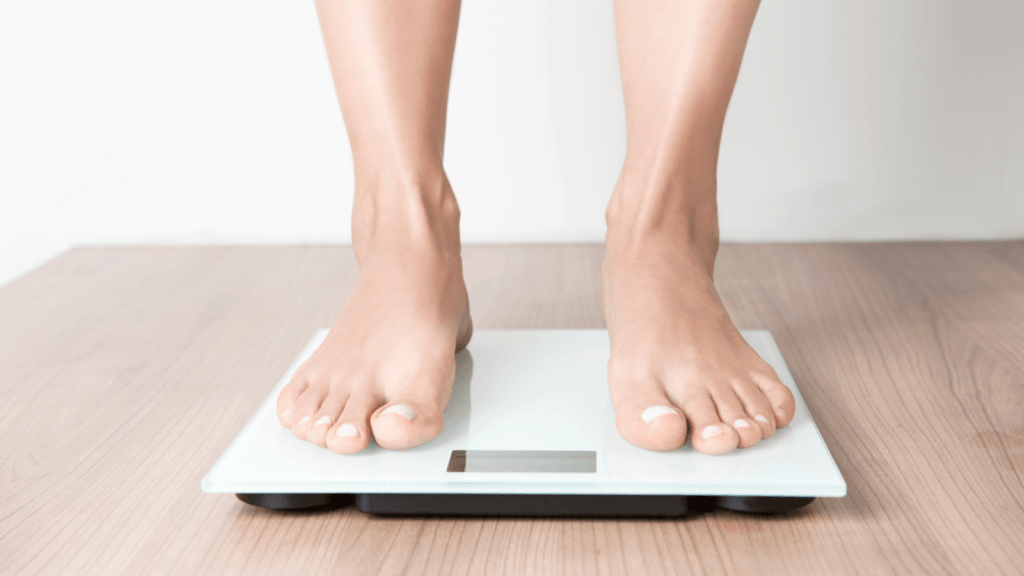
Written By: Aline Browning
Dramatic weight gain can be emotionally crushing. It’s made me doubt my self worth, causes physical pain, and has even been a financial burden when I’ve had to buy all new clothes. When I turned 40, I began to struggle with weakness and fatigue that was first thought to be anemia.The diagnosis was updated after some testing a few months later and I was told I had Hypothyroidism.

The weight gain started soon after that and while I was used to fluctuating by a few pounds, this was different because my whole shape was changing quickly. I wasn’t just gaining weight in problem areas, everything was getting bigger. Even pulling a sweater over my shoulders felt different. I was very fit in my 20s and 30s. I weighed 122 pounds. I ran 2.5 miles on an elliptical machine 3-4 days a week, I lifted weights, did resistance training, and wore extra small-sized clothes. My weight fluctuated by a few pounds, but I was always under 130 lbs. Then I received my diagnosis two years ago. I am now at 167 lbs. and climbing.
In two years I have had to have four wardrobe changes and I now wear large-sized clothing and frankly, that makes me sad at least 20 times a day. Every time I attempt to button my coat, lift something heavy, or try on new clothing, I feel like I am losing more and more of myself. To me, it seems to be happening incredibly fast. It’s like I’m watching a photograph of myself just blur before my eyes. To spectators, it may seem like the answer is to make lifestyle changes and get back in shape, but that is a leaf that doesn’t turn over so easily when you have Hypothyroidism.
Hypothyroid weight gain isn’t caused by fat, but by enlargement and softening of muscle mass, so burning it off is impossible. I try to make lighthearted jokes about how I’m “hulking” out of my clothes but at the end of the day, it really still just hurts to think about my body changing this way. I feel powerless over it.

One of the reasons it is so difficult to “attack” the progression of hypothyroidism is because there is a plethora of underlying autoimmune diseases that may be causing it. Getting to the bottom of the cause of one’s hypothyroidism can take as long it takes to diagnose systemic lupus erythematosus (SLE) and Rheumatoid Arthritis (RA). “On average it takes 6 years to diagnose SLE”, Lupus.org (2021) which translates to roughly 6 years of unchecked damage to the body caused by either the underlying condition or the hypothyroidism.
I was extremely crushed to receive the diagnosis, but not surprised, as thyroid disease is common in the women in my family. My younger sister was diagnosed with Graves disease about eight years ago and she has struggled terribly through her symptoms. She endured drastic weight loss, muscle weakness, headaches, and the worst were her bulging, ulcerated eyes. I was so distraught over her symptoms that I didn’t think about the possibility of me having a thyroid disorder, too.
Thyroid Disease In Women
Thyroid disease is predominantly gender specific and mostly impacts women. According to Dr. Klein from the American Heart Association (2007), “Current estimates suggest that it affects as many as 9% to 15% of the adult female population and a smaller percentage of adult males.” Lo and behold, I found myself in the ranks of that statistic.
“Virtually all studies report higher prevalence rates for either overt or subclinical hypothyroidism in women with advancing age.” According to Dr. Morganti from National Center for Biotechnology Information, “epidemiological data from the aging population confirms that men are less affected by thyroid disease than women.”
Unfortunately, ] but there are many other complications that arise from this disorder that many might not know about. Familiarizing yourself with some of the more serious and common complications can help you prepare and to source tools and knowledge that will help you combat its effects. Getting a power lift recliner, for example, can enhance your mobility during a time when mobility is threatened by Hypothyroidism and the autoimmune diseases that cause it.
According to the Mayo Clinic (2021), “Symptoms may include fatigue, increased sensitivity to cold, weight gain, muscle weakness, muscle aches, muscle tenderness and stiffness, and depression among others.” Hypothyroidism is a disease that impedes your mobility over time and causes musculoskeletal weakness.
Power Lift Recliners Can Help with Balance Issues

Hypothyroid myopathy is a common complication of hypothyroidism that reportedly affects “almost 80 percent of patients with hypothyroidism. Patients with severe or untreated hypothyroidism can develop significant muscle disease leading to severe functional limitations.” Fariduddin, (2021).
UltraComfort power lift recliners provide supportive and ergonomic lift assistance that will help you carefully stand to your feet. If muscle responses are slower, it can impact an individual’s balance which is especially true with elderly patients. “The most common symptoms include weakness around the hips and sometimes the shoulders, and a slowing of reflexes. Some people also experience muscle stiffness and painful muscle cramps.” Muscular Dystrophy Association, (2021).
Hypothyroidism and Circulatory Complications
Hypothyroidism can affect cardiac contractions the same way it affects type 2 muscle fiber contraction, which can result in cardiovascular complications. According to the American Thyroid Association, “symptoms may include slowing of the heart rate, constriction of the blood vessels and increased blood pressure, retention of fluid and edema and an increase in cholesterol levels. Severe cases of hypothyroidism can cause heart failure and death.”
Hypothyroid myopathy is a common complication of hypothyroidism that reportedly affects “almost 80 percent of patients with hypothyroidism. Patients with severe or untreated hypothyroidism can develop significant muscle disease leading to severe functional limitations.” Fariduddin, The condition of the muscles themselves are characterized by, “swollen and pale muscle tissue with loss of striations and increased separation between the muscle fibers due to mucinous depositions. Type I muscle fiber hypertrophy, type 2 muscle fiber atrophy.” Fariduddin, (2021) This condition causes your muscles to contract more slowly and can exacerbate a patient’s risk for falls when standing.
Thyroid Stimulating Hormones (TSH) is thought to reverse the adverse effects of hypothyroidism on the cardiovascular system. Truthfully, with treatment, there is a fine line to walk as over-treatment can be equally detrimental. “Per Somwary et al., 20% of patients with hypothyroidism may be over-treated during (hormone) replacement therapy leading to increased risk of atrial fibrillation, especially among the elderly. Despite the improvement in both symptoms and cardiac contractility, close observation is needed when starting thyroid hormonal therapy, particularly in the elderly and in those with known coronary ischemia.” Francois, (2020).
“Having hypothyroidism can change the viscosity of the blood, which can lead to increased systemic vascular resistance (SVR), and SVR is the pressure that regulates our blood flow. Now with decreased cardiac output and venous blood struggling to return to the heart, the chance for inflammation has greatly increased through the shedding of blood cell waste.” Klein (2007) Leg elevation can help to reduce some of this blood cell waste by making it easier for blood oxygen to reach the brain. UltraComfort power lift recliners offer leg elevation with infinite positioning, so you can adjust your leg elevation for comfort while encouraging improved circulation.
You Owe it to Your Body to Find Out What is Causing Your Hypothyroidism
When I started my research for this blog post, I hadn’t been educated on the connection between autoimmune disease and Hypothyroidism. I just assumed that a few lifestyle choices would get me back on track. At that point, I was forced to face a detail that I have been ignoring for about a year now. I have had increasing severity in the arthritis in my neck and about six other joints in my body. Sometimes a simple gesture like shaking my head “no” will cause my neck to become stuck. It is painful, not to mention really socially awkward. It is also a detail that I have ignored for too long. So, I had a hearty tearful moment at my desk and then I called my doctor to set up testing for RA.
He is ordering testing for systemic lupus eurythmatosus (SLE) as well because autoimmune diseases are imposter diseases that are difficult to diagnose. He didn’t hesitate to set up the tests and he was very forthcoming when he told me that it may take years to confirm. I want to start the process now that I know that time is not on my side with diagnosing the autoimmune disease. I know that there are treatments and lifestyle changes that can reduce or slow the progression of this condition, but that can’t be achieved until I know which disease is causing it. I know one thing for sure, I work and live in close proximity to the world’s leading lift chair manufacturer so as my mobility needs change, I’ll have some amazing accessibility options and you have those options, too. I encourage you to find an UltraComfort retailer near you to start sourcing the tools you need to help make every day of your life easier and more comfortable.

https://www.ncbi.nlm.nih.gov/books/NBK519513/
https://www.mayoclinic.org/diseases-conditions/hypothyroidism/symptoms-causes/syc-20350284
https://www.ahajournals.org/doi/10.1161/CIRCULATIONAHA.106.678326
https://pubmed.ncbi.nlm.nih.gov/16760635/
https://www.ncbi.nlm.nih.gov/pmc/articles/PMC7331968/
https://unsplash.com/photos/ neonbrand-5ddH9Y2accI-unsplash
https://unsplash.com/photos/ cdc-7uSvaBY69d0-unsplash
https://unsplash.com/photos/ jon-flobrant-_r19nfvS3wY-unsplash
https://unsplash.com/photos/ ales-maze-aDYBhg-4htc-unsplash

